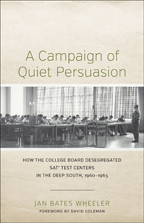
256 pages / 5.50 x 8.50 inches / 2 halftones
History / State & Local History
In 1960, the College Entrance Examination Board became an unexpected participant in the movement to desegregate education in the South. Working with its partner, Educational Testing Services, the College Board quietly integrated its Scholastic Aptitude Test (SAT) centers throughout the Deep South. Traveling from state to state, taking one school district and even one school at a time, two College Board staff members, both native southerners, waged “a quiet campaign of persuasion” and succeeded, establishing a roster of desegregated test centers within segregated school districts while the historic battle for civil rights raged around them. In the context of the larger struggle for equal opportunities for southern black students, their work addressed a small but critical barrier to higher education.
Shedding light on this remarkable story for the first time, Jan Bates Wheeler tells how the College Board staff members—Ben Cameron and Ben Gibson—succeeded. Their candid and thoughtfully written records of conversations and confrontations, untouched for nearly fifty years, reveal the persistence required to reach a goal many thought unachievable and even foolhardy. Indeed, their task placed them in the unusual position of advocating for school desegregation on a day-to-day basis as part of their jobs. This positioned Cameron and Gibson squarely in opposition to prevailing laws, customs, and attitudes—an ill-advised stance for any nascent business venture, particularly one experiencing competition from a new, rival testing organization purported to accommodate openly those same laws, customs, and attitudes.
Cameron and Gibson also accepted the personal danger involved in confrontations with racist school officials. The officials who cooperated with the pair assumed even greater risk, and in order to minimize that threat, Cameron and Gibson pledged not to publicize their efforts. Even years after their work had ended, the two men refused to write about their remarkable campaign for fear of compromising the people who had helped them. Their concerns, according to Wheeler, kept this remarkable story largely untold until now.
Jan Bates Wheeler is associate director for Accreditation, Office of Academic Planning at the University of Georgia.
“As Wheeler takes the reader through the footwork of evaluation and compliance, the real work of desegregation becomes clear. This book reveals the cooperative, and peaceful, triumphs of institutional change in the Deep South, a refreshing departure from the polarized political accounts of this era.”—Journal of Southern History
“Highly recommended.”—CHOICE
“Wheeler uncovers an unexpected dimension of the civil rights struggle and expands understanding of the struggle to integrate southern education.”—Journal of American History
“Wheeler offers a tremendously rich account, filled with vignettes of College Board employees’ visits to Deep South communities in various stages of negotiation with racial change in the 1960s. . . . A Campaign of Quiet Persuasion is an intricately narrated, carefully argued work with great value to those interested in educational desegregation and race relations generally in the U.S. South after World War II.”—David T. Ballantyne, H-USA
Found an Error? Tell us about it.